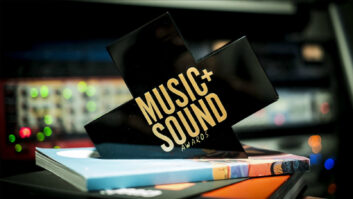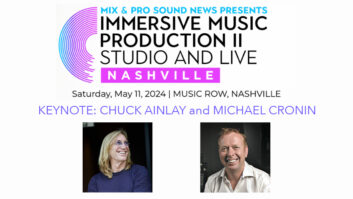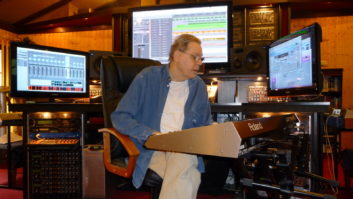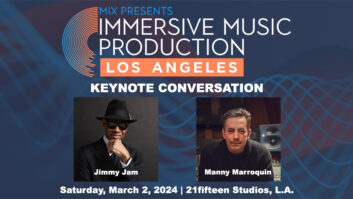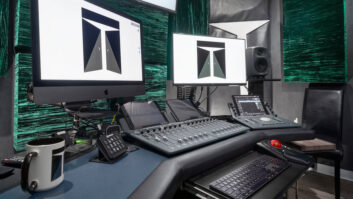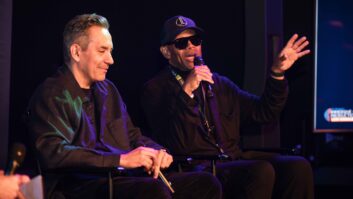
Guitarist, singer, producer and raconteur Chuck Prophet first came to notice when he hooked up with Arizona neo-psychedelic band Green on Red in the mid-1980s, but it’s his many solo albums and collaborations—with the likes of the Rubinoos, Kim Richey and Alejandro Escovedo—that have secured him a place in the pantheon of great American songwriters, musicians and performers.
Prophet’s latest album, The Land That Time Forgot, was released Aug. 21. It was recorded with Prophet’s Mission Express band, which includes his wife, Stephanie Finch. August also saw the publication of Prophet’s biography, What Makes the Monkey Dance, written by his official archivist, UK college professor Stevie Simkin.
Born in Southern California, Prophet has long lived “in the heart of the heart of San Francisco,” as he describes it. The new album began in the Bay Area but was recorded mainly at Old Soul Studios, located in the old Borscht Belt in New York’s Catskills. Old Soul is owned by musician, engineer and producer Kenny Siegal.
A good number of the songs, many written with longtime collaborator klipschutz, mine the past to make sense of the present. “Marathon,” for instance, likens Depression-era dance marathons to today’s precarious gig economy. There’s a distinctly political edge, too, with “Get Off the Stage” aimed squarely at the White House.
The COVID-19 pandemic delayed the album’s release and is keeping Prophet from his beloved live performances. Meanwhile, his weekly two-hour Trip in the Country show on the Gimme Country online radio network is keeping him occupied.
On starting the new record
There were a lot of twists and turns in the road. It really started in Oakland in Matt Winegar’s garage, with me going over there, playing songs to a click. We’d pass the bass and guitars around and do these down-and-dirty demos. He’s an old friend of mine—we’ve probably done our body weight in drugs together.

I hadn’t gotten that kind of “demo-itis” in a long time, so we decided to get into a place where we could breathe a little bit and went to a studio in San Francisco called Decibelle Recording. JJ Wiesler is the owner; he’s got an API [console] and a 2-inch machine. We started reworking some of those demos, overdubbing some of them, and tracking as a group. But then we hit a wall. We were having difficulties with people’s schedules.
One night, Matt and I were getting frustrated and left the studio at 2 in the morning. Matt’s car had been towed. We went to the tow yard and there was a clerk behind bulletproof glass. We’re trying to reason with him and get the money together. We said, “What are we doing? Why is everything so hard?” So we hit the pause button.
I had some solo dates booked out East—me, a guitar and a rental car. I’d talked to this guy Kenny Siegal, who has a studio in a historical mansion in Catskill, NY. I had a day off and said, “I’ll play you some songs and we can mess around.” He picked some musicians, and some other musicians just seemed to drop by, and nobody seemed to be in a hurry. I got a song or two that day that I was happy with without much effort. I said, “Maybe I want to return to this place.”
On Working at Old Soul Studios
I went back to San Francisco, got some more songs together, and brought James DePrato, my guitar player, back out there with me. We moved into the mansion. We’d get up and make coffee and play the piano and it ended being a quiet place where I could think.
I played acoustic on the tracking, which I don’t normally do. Because of the bleed, it was too much trouble to replace the acoustic or the vocals. I was determined to get my vocals live. I was getting my Blood on the Tracks fantasies, working it out. I had musicians that were quick on their feet, so it was kinda cool.
Kenny and I fought like cats and dogs over everything—but we needed him. He managed to corral us musicians and created an environment where we could all work this stuff out on the floor.
On the album art
It’s very difficult to be an analog purist, and I’m not really in that business, but I was able to use a photograph from one of my favorite photographers, Jim Goldberg, so I encourage people to get the vinyl. Not only because it’s analog, but also because it’s affordable art. You buy the first Velvet Underground record on vinyl and not only do you have a masterpiece of an album, but you also have a Warhol in your home.
BREAKING NEWS: As you have no doubt heard by now, today @yeproc will be releasing “The Land That Time Forgot” on CD, digital and (yes, oh yes, yes….vinyl too!)https://t.co/6fQAvo5qgU pic.twitter.com/k1weaRY3Xa
— Chuck Prophet (@ChuckProphet) August 21, 2020
On songwriting
When it comes to songwriting, I’m always excited when there’s some content. That helps me figure out how to cast the movie, you know? But sometimes I don’t figure these things out until later. With “Best Shirt On,” it was only later that I realized I used to see my dad when he lost his job. I would see him at the breakfast table in his three-piece suit. He would smell of cologne. He’d have the want ads out. I’d ask, “Where are you going?” Now, with the pandemic, it takes on a new meaning; you can’t stay in your pajamas all day.
On music during lockdown
I don’t think people realize musicians are total homebodies. We like to lay around and listen to music and play guitar. For some people, that’s their idea of going stir crazy; for us, it’s heaven. We’ve had record release parties scheduled and canceled, and rescheduled and canceled, so we’re just rolling with it. I don’t know that playing online is any way to replace the physical experience, so I’m trying not to be cranky about that. I’m just trying to be positive on some level.
Chuck Prophet • www.chuckprophet.com • Twitter @ChuckProphet
